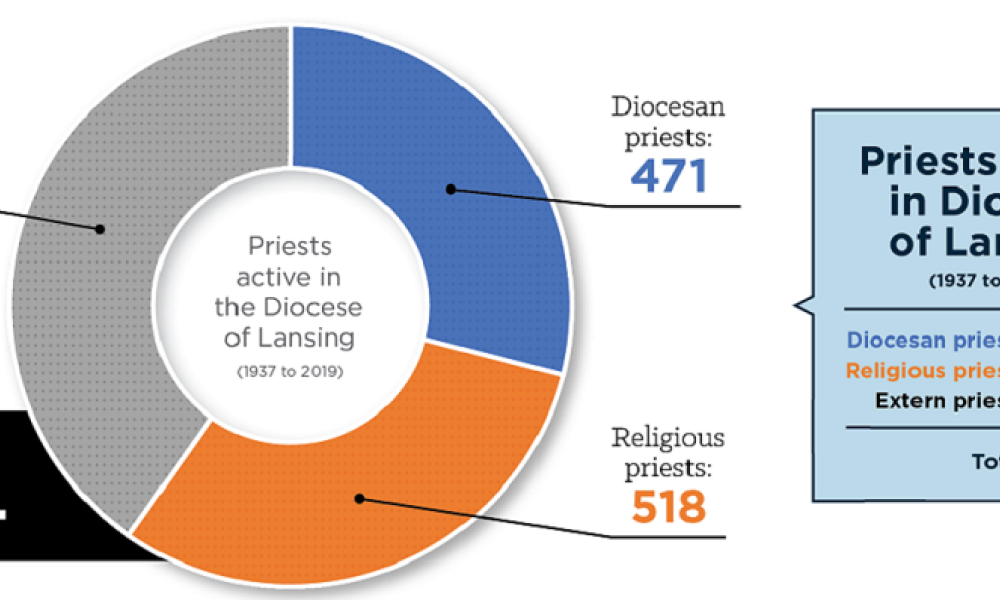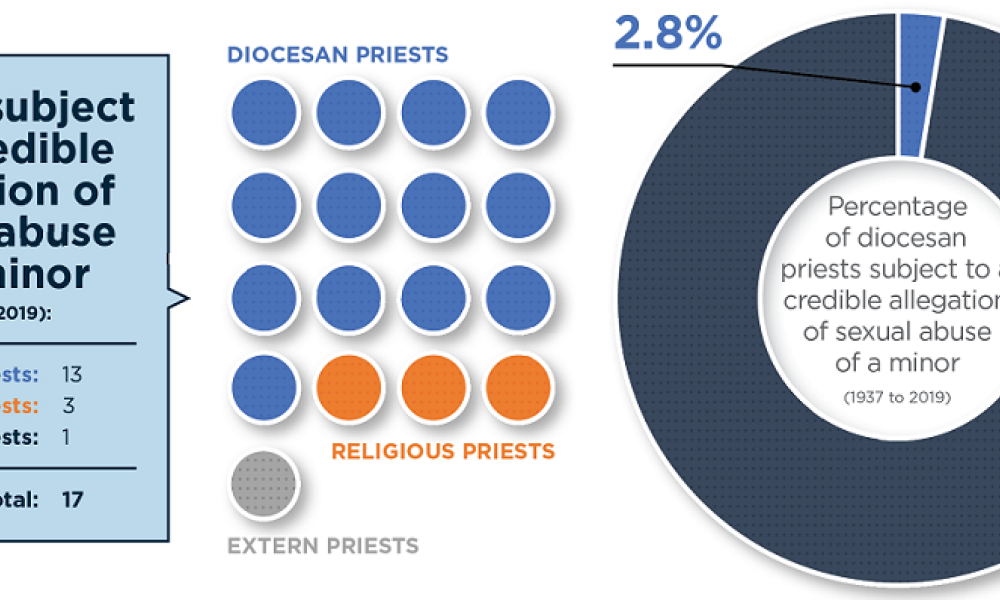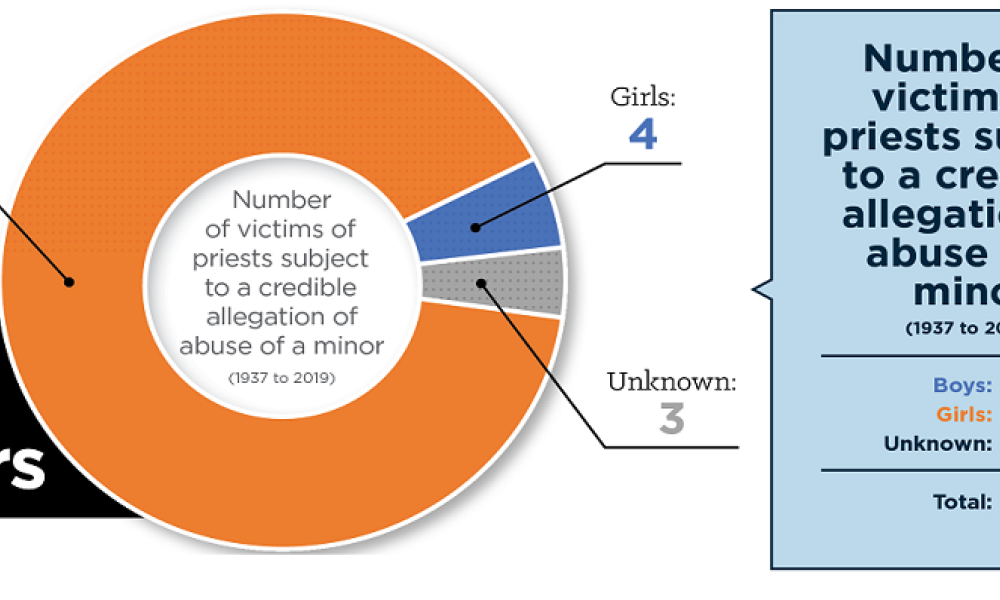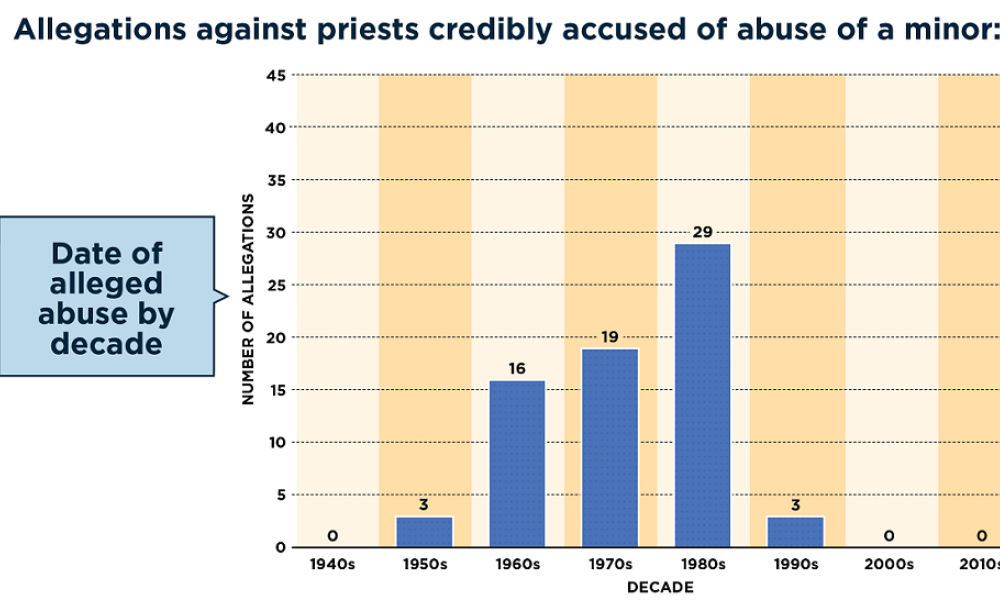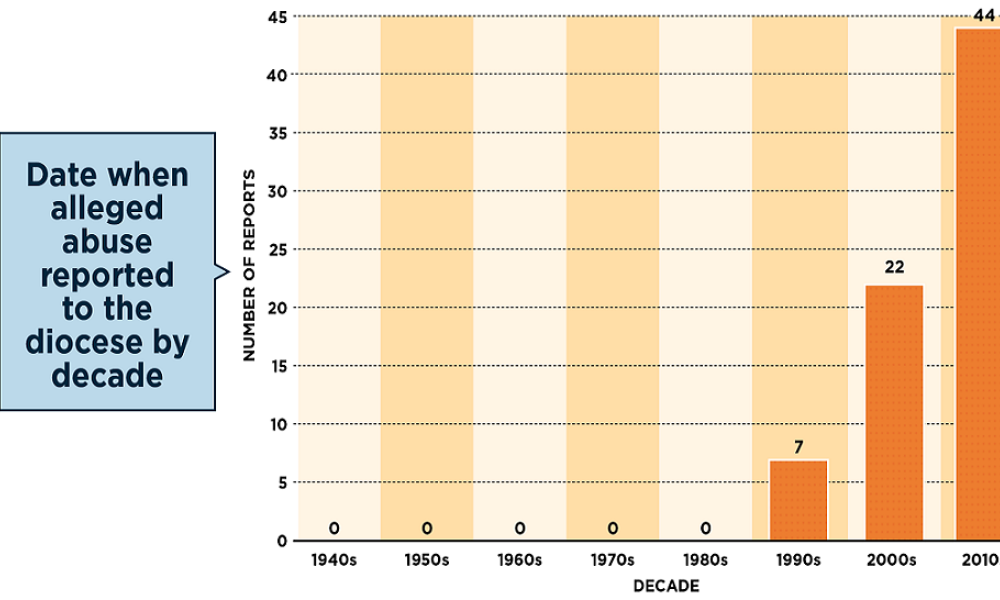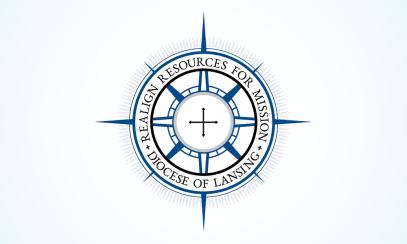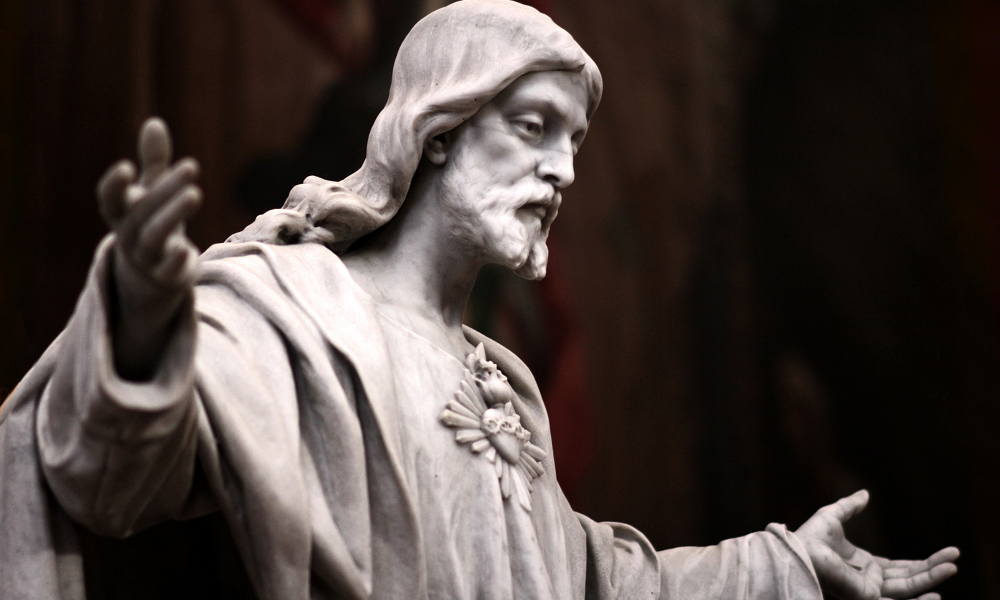
Clergy Sex Abuse Scandal Update
For a list of priests in the Diocese of Lansing who have had credible allegations of sex abuse against a minor, visit the Diocese of Lansing website HERE. 



For a list of priests in the Diocese of Lansing who have had credible allegations of sex abuse against a minor, visit the Diocese of Lansing website HERE.



IN SEPTEMBER 2019, the Diocese of Lansing published a list of priests who have been subject to a credible allegation of sexual abuse of a minor. The list dates from the foundation of the diocese in 1937 until the present day, and includes diocesan clergy, religious order priests accused of abuse within the diocese, and those priests who were ordained for another diocese but who resided in the Diocese of Lansing for a period of time, known as “extern” priests.
Following the adoption of the 2002 Charter for the Protection of Children and Young People and the Essential Norms, the Bishop of Lansing established a Review Board. The Review Board advises the bishop in his assessment of allegations of sexual abuse of minors, his determination of a cleric’s suitability for ministry, and in the diocese’s pastoral response to the victim.
For purposes of the Diocese of Lansing’s published list regarding credible allegations of clerical sexual abuse of a minor, “a credible allegation” means that one or more of the following exists:
- The Bishop of Lansing determined that the allegation was credible, i.e., that the allegation appeared to be true. For allegations made after the Diocesan Review Board was established, the bishop’s determination was made with advice from the Review Board;
- The accused admitted the allegation;
- The allegation resulted in a criminal conviction;
- The allegation resulted in the accused’s removal from ministry or laicization; or
- The allegation resulted in a civil settlement with either the accused or the diocese.
Since 1937, there have been approximately 1,671 priests who served within the Diocese of Lansing, consisting of 488 diocesan priests, 518 religious priests, and 665 extern priests.
In total, 17 clerics have a credible allegation of sexually abusing a minor: 13 diocesan priests; 3 religious priests; and 1 extern priest. All of those priests are now dead or no longer in active ministry.
The Diocese of Lansing has received 73 total allegations against these 17 men. The victims include 66 boys, 4 girls, and 3 where the allegation of abuse did not report the gender of the victim. The diocese hopes the publication of this list will assist these victims in finding healing, and will encourage presently unknown victims to come forward. It is also hoped that this information will assist in ensuring that such abuse never happens again.
The majority of credible allegations of abuse stem from the years between the 1960s and mid-1990s. The Diocese of Lansing is not aware of any credible allegations of sexual abuse of a minor occurring since 2000.
In 2002, the Catholic Bishops of the United States adopted the aforementioned Charter for the Protection of Children and Young People. The Charter led to a fundamental and comprehensive change in the way the Church addresses sexual abuse of minors. The Charter requires:
- that all allegations of child sexual abuse be reported to law enforcement;
- that every diocese has an independent review board to evaluate the legitimacy of these allegations;
- that any priest who is found to have abused a child must be permanently removed from ministry;
- that every diocese must retain a victim assistance coordinator and establish a safe environment program to implement preventive measures;
- that dioceses offer pastoral assistance to all victims of abuse;
- and that dioceses not demand that settlements of lawsuits be kept confidential.
The Diocese of Lansing has implemented the requirements of the Charter. Moreover, the diocese expects all employees and volunteers to exemplify the teachings of Jesus Christ, and holds accountable those who fail to live up to that expectation. In particular, the diocese expects clergy to adhere to their vow of celibacy. Sexual abuse of any sort – whether of a minor or an adult – is a betrayal of Jesus Christ.
The Diocese of Lansing intends to update this list in the event that additional information is discovered or brought to its attention, or if additional allegations of sexual abuse of a minor are determined to be credible within the parameters set forth above. In the event that any changes are made to the list, the updated list will be posted on the diocesan website.
As Bishop Boyea reminds us in his column, this present crisis will not be over until healing and peace is brought to all those who are affected. One case of abuse is one too many. When it comes to safeguarding against sexual abuse, the Diocese of Lansing can never, and will never, rest.
WE PLEDGE TO HELP THOSE AFFECTED FIND HEALING AND PEACE
- From the Bishop -
THE GREAT 19TH CENTURY MODEL of priestly life, St. John Mary Vianney, described the priesthood as “the love of the heart of Jesus.” Through the grace of ordination, the priest becomes an alter Christus, another Christ. He is in Christ, for Christ and with Christ, at the service of all. This is why the holy priesthood has traditionally been held in high regard and deep affection among our Catholic community and, indeed, across the wider society.
In recent decades, however, the standing of the priesthood for many has been diminished or even, for some, demolished. The scandal of clerical sex abuse has distressed and demoralized faithful Catholics while making the Church less credible to those who are not Catholic. More gravely, the immoral and illegal actions of some clerics have shattered the lives and faith of their victims. There can be few civil or moral crimes of greater gravity than harming or scandalizing the young. I know I am not alone in feeling deep shame and sorrow upon learning of the plight of victims in recent years. I have met with many of them; all deserve our compassion, solace and support. As a Church, we are deeply sorry for what happened to you. As your bishop, I offer you a profound apology for the sins of my brothers. As a diocese, we are pledged to help you find healing and peace.
This month, the Diocese of Lansing is publishing the list of those clerics, diocesan and religious, who have served in our diocese and who have had credible allegations of sexual abuse of a minor against them since the diocese’s founding in 1937. The list and accompanying statistics are based upon the best evidence and documentation we presently have on file but are, of course, open to revision as we gather more information. Indeed, it remains my intention to have an external audit of all our priest files. This audit, however, has been delayed due to the Michigan Attorney General’s seizure of our files in October 2018.
As regards this month’s published list, the primary intended audience is victims of abuse: to encourage presently unknown victims to come forward; to help victims expose their abusers; and to assist victims in finding healing. It is also hoped that this information will assist all to ensure that such abuse never happens again. The figures as published also seem to suggest certain trends.
First, the majority of credible allegations of abuse stem from the years between the 1960s and mid- 1990s. Why could this be? Well, the best evidence would suggest that, not surprisingly, the internal life of the Catholic Church has not been immune to the profound moral confusion unleashed upon our society by the sexual revolution of the mid-20th century. This proposition is offered by way of explanation. It can never be an excuse. If true, however, it would suggest that the roots of the present crisis are to be found in a lack of faithfulness to the moral teachings of the Church and to the promise of celibacy. Our response as both clergy and lay faithful must then, surely, involve a radical return to the highest standards of personal holiness, including holy purity.
Second, there is a notable drop-off in credible allegations of abuse pertaining to the years since the turn of the century. In fact, the Diocese of Lansing is not aware of any credible allegations of sexual abuse of a minor occurring since the turn of the century. While also very aware that sexual abuse can sometimes go unreported for decades, there nevertheless seems to be ground for cautious optimism. We hope that the better use of Safe Environment structures, better screening and formation of seminarians, and the constant grace of God assisting us to be chaste are bringing about this improvement.
While this issue of FAITH magazine is focused on sexual abuse of minors, I must also speak briefly to the issue of clerical sexual abuse of adults. The Diocese of Lansing is presently reviewing its policies for addressing sexual abuse of adults, and is considering establishing an independent lay review board to help me address such allegations. The U.S. Conference of Catholic Bishops is also presently establishing a reporting system for reports of abuse by bishops.
Amid the publication of statistics and policies, it should be remembered that, ultimately, this present crisis will not be over until healing and peace is brought to all those who are affected. When it comes to safeguarding against sexual abuse we can never, and will never, rest. One case of abuse is one too many. Our work and ministry continue.
Our Lady, Comforter of the Afflicted, pray for them and us.
How does the Diocese of Lansing help protect children from abuse?
- Reba Sommer, Safe Environment Coordinator -
THE OFFICE OF CHILD AND YOUTH PROTECTION is pleased to share the progress of the kNOw Program, the latest addition to the programs and policies designed by the Diocese of Lansing to help protect children from abuse.
The kNOw Program was designed specifically for the Diocese of Lansing over the last year and a half with input from catechists, teachers, principals and diocesan staff. Developed by Monica Pope, a member of St. Joseph parish in Howell, the program offers guidance and empowerment for parents and their children in Kindergarten through grade 8 when they gather in schools, churches and youth groups.
According to Safe Environment Coordinator Reba Sommer, more than 120 adults have been trained to present the kNOw Program to children and their parents. The program has four goals:
- To help children and their parents know how to identify and talk about safe, respectful behaviors and situations.
- To help children know how to identify and talk about behaviors and situations that are not safe.
- To help adults appropriately respond to children’s concerns about being unsafe and/or disrespected.
- To inspire Christian communities to greater integrity and authenticity in creating unfailingly safe environments for children.
Reba says that the need to update the program to include guidance in using social media initiated a search for new materials almost two years ago. But some other significant aspects of the kNOw Program appealed to those involved in its selection. First, it requires a trained, certified facilitator to lead, encourage and respond to questions that participants may have. Probably most significantly, with the kNOw Program, parents attend the presentation with their children. In this setting, parents not only learn what their children are learning, but also what they need to know about keeping children safe and how to respond to children’s concerns about being safe.
Reba is grateful for the time devoted by many people from parishes and schools for reviewing and helping refine the program, and especially the original author, Monica Pope. Reba is proud of the work being done by her partners in the Safe Environment Office and loves her job. She tells the principals, priests and DREs she serves: “I want every parish and school in the diocese to be the safest place you can leave your kids.”
BY THE NUMBERS:
7,413
Criminal background checks have been processed on priests, deacons, candidates for ordination, and parish and school employees and volunteers.
8,842
Adults have been trained in Protecting God’s Children Awareness Sessions as of June 30, 2019
12,878
Children have been trained in Protecting God’s Children Awareness Sessions as of June 30, 2019
What happens when a survivor of clergy sexual abuse contacts the victim assistance coordinator of the Diocese of Lansing?
- Cheryl Williams-Hecksel, Victim Assistance Coordinator -
WHEN A CALL OR EMAIL from a survivor is received, Victim Assistance Coordinator Cheryl Williams-Hecksel, LMSW, ACSW, responds as soon as possible. Cheryl says, “When someone makes a decision to report, it takes so much courage to come forward – and they are so anxious about it. I make every effort to get back with them within a day.”
Once Cheryl connects with the survivor, she reviews the process so the survivor knows what to expect. She assures each person that the information they share will be reported to law enforcement officials to investigate, and that the diocese will keep the information in the strictest confidentially to protect them.
She encourages each person to report the abuse directly to law enforcement themselves, and provides information for doing so. Cheryl explains that the investigation of the abuse may move more quickly when reported directly by a survivor, but assures the survivor that the diocese will report the abuse regardless of their decision to report it themselves.
Before gathering information, Cheryl also shares the goal of the diocesan process for responding to survivors of clergy sexual abuse: to provide the pastoral care needed to help the survivor heal from the experience of being abused.
Cheryl then asks each person to tell her what happened to them and records the information. She prepares a report summarizing what the victim has shared with her, and from this, the diocesan attorney prepares a letter reporting to law enforcement.
Cheryl also attends the Diocesan Review Board, which advises the bishop regarding suitability for ministry, and updates the Review Board regarding allegations of abuse and ongoing care of survivors.
Cheryl remains attentive to her primary task: providing pastoral care for the survivor. Cheryl works to develop a relationship with each person to determine his or her greatest needs and ways the diocese can support healing. While some survivors want only to report abuse and decline any support, many survivors need and accept the support the diocese provides. Cheryl explains that the support for each person is individualized and can include:
- Counseling services. Cheryl recommends providers who specialize in counseling survivors of sexual abuse, and the diocese covers the cost of uninsured charges.
- Spiritual support. Cheryl provides the names of priests or other clergy when survivors seek spiritual support. The diocese offers Time to Heal Retreats, designed especially for survivors of sexual abuse (at right). Cheryl provides information about other resources available locally and in neighboring dioceses.
- Practical support. The trauma caused by abuse affects all areas of an individual’s life and, as needed, Cheryl offers guidance and help related to some of the daily challenges that survivors face.
- Information. Sometimes survivors ask only for information about reporting to the diocese or to law enforcement.
Cheryl explains one of the most important steps toward healing may be when a survivor accepts an invitation to meet with Bishop Boyea. The goal of the meeting is to give the survivor an opportunity to express their pain and feelings and to have the bishop listen, acknowledge and apologize for the pain caused by the abuse and to express his commitment to helping them heal.
Cheryl is encouraged by the outcomes she sees in the ministry to survivors of abuse. At the request of attendees of the last retreat, a day has been added to the next retreat, and opportunities for follow-up gatherings are being planned. Cheryl reports, “Every individual that was there, expressed some kind of growth in some area.” She is hopeful as she anticipates the continued growth of this ministry to survivors of abuse in our diocese.
Special Report: Charts
Review The kNOw Program online at: https://www.dioceseoflansing.org/human-resources/know-program
A TIME TO HEAL RETREAT - MAY 15-17, 2020
"A Time to Heal” is a weekend designed specifically for survivors of sexual abuse by clergy and to assist with the complexity of the healing process.
Register online at WWW.STFRANCIS.WS/A-TIME-TO-HEAL. HTML or call St. Francis at 517.669.8321.

